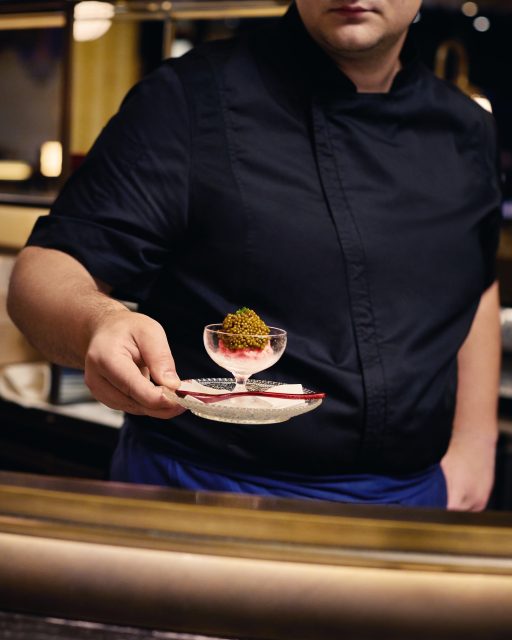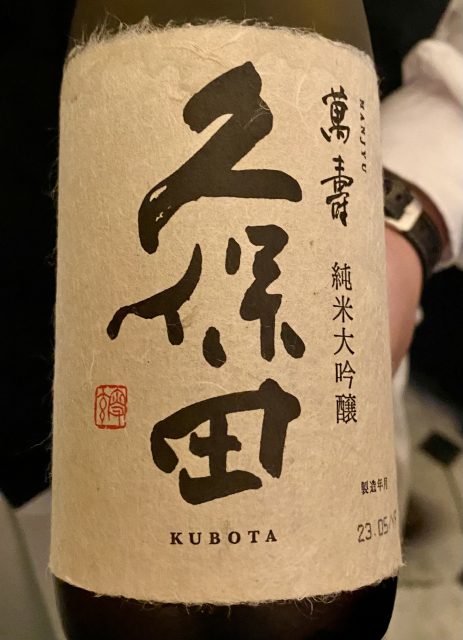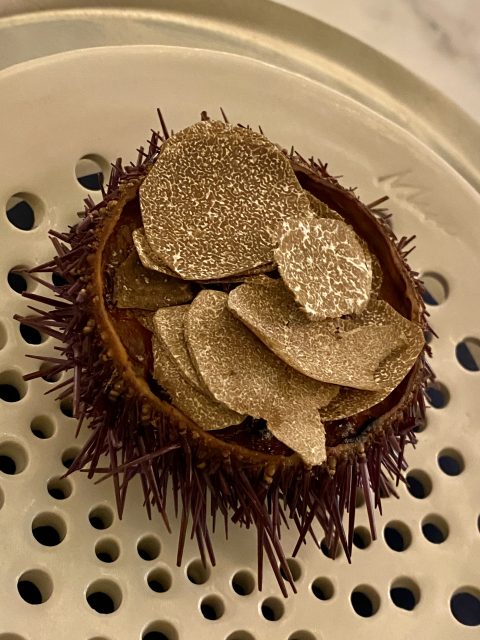Douglas Blyde discovers if Sushi by MASA in the Harrods Dining Hall really is worth the price tag, or whether it’s papering over the cracks with an abundance of caviar and black truffle.
“Chef Masayoshi (‘Masa’) Takayama has three Michelin stars in New York and this is his first foray across the Atlantic,” noted Hot Dinners’ Catherine Hanly of the centrepiece restaurant within Harrods’ newly upgraded, wagyu and caviar equipped, Grade II-listed Dining Hall.
Design
Under a ceiling pasted with tiled peacocks, turkeys, falcons, and deer, two counters, each seating 20 guests, are cut by a cordoned hub where a jazz band coos later into the week. A quintet of other eateries orbit, ranging from an incarnation of the phenomenally successful Pasta Evangelists by Perbellini, to Kinoya Ramen, the oddly deserted Assembly Mezze & Skewers, Kerridge’s Fish and Chips which already proved a winning formula, and Harrods own devised project, The Grill. Elsewhere in the building, which feels increasingly like a culinary mall, which is no bad thing, you will find the beautifully styled Studio Frantzén, Chai Wu with its Korean lobster, and wagyu puffs, and Pizzeria & Pasqua, the latter catering to no fewer than 700 walk-ins daily.

Guests, including the photographer, Dave Bennett spotted, but not papped, on our visit, perch on swivel seats at a marble effect scalloped counter. Less usual in London for the service of haute Japanese cuisine, the wraparound setting leaves nowhere to hide anything, including kitchen machinery and glowing till screens. This culls any sense of meditative peace which might normally help to ensure a sense of hushed reverence betwixt time-poor, cash-rich diner and highly trained chef.
In attendance at both counters is restaurant manager, Patricio Torres, formerly GM of Rick Stein, Barnes, and Roka, Charlotte Street, while overseeing all matters culinary is Harrods’ senior restaurant operations manager, Julian Catzeflis, formerly of Birley Clubs, Nobu Hotel Shoreditch, and Zuma. During our sitting, Catzeflis mentioned if he ever got locked in the world’s most famous department store after hours, rather than heading to the watch department to try on a few Rolexes, he would instead head for rest in one of the world’s finest beds displayed on the third floor.
Drinks
Dominated by the vast Dassai brand, which accounts for 10% of all exports, Sushi by MASA features 15 sakes on its list. This is 11 more than may be found via retail elsewhere in Harrods, which even purveys a £75 “Sake Bath”, a “purifying soak inspired by ancient beauty rituals of Japanese Geishas.” Options open at £30 per 240ml carafe of Nanbu Bijin Tokubetsu Junmai, described by merchant, London Sake as a “Perfect beginner’s sake”, progressing to £1,350 for a bottle of Dassai’s Kubota Tssugu Junmai Daiginjo (£750 retail). Vinously, Krug 170 rolls in at £85 per glass or £510 a bottle, while Jacques Selosse Brut Rosé is available at roughly double retail price at £1,500. The largely white-led still selection opens with the chiselled Txakolina Uno, Bat Gara, tempered with Riesling, at £9 by the glass, progressing to 2016 Joh. Jos. Prum Wehlener Sonnenuhr Riesling Auslese Goldkapsel at £45 via Coravin, although Riesling fans with a bigger appetite may find a Methuselah of Egon Muller’s Scharzhofberger Riesling Auslese Goldkapsel 2018 in the wine department for a mere £14,500.08 (reduced from £16,800).

By the bottle, Ornellaia Blanco 2019 is relatively tenderly marked up at £465, while Masseto 2004 costs £3,500, Comtes Lafon Montrachet Grand Cru 2018 is close to retail at £4,000, and Le Montrachet Domaine de la Romanée-Conti 2007 (also available at Studio Frantzén) is £30,000 compared to about £10,000 retail. Yet there is no official sommelier at Sushi by MASA to deal with such a hallowed capsule. Japanese whiskies include Hombo Suzo’s cult Mars Komagatake at £31 a double, while Pappy Van Winkle 15, a whisky priced close to £3,000 on the open market, was at the time of our visit, offered at a courteous £39 a double. Cocktails include the “Torii Sunset”, collaging Hibiki Harmony, elderflower, “Yuzushu” (yuzu meets shochu), mandarin, and soda.
Dishes
Today’s omakase experience was realised by chef, Kusumo, who has been here “since day one” said Torres. Alongside, in the absence of a sommelier, cheerful waiter, Christian Navata, paired three Junmai Daiginjos. It is worth noting despite it not being mentioned at the time of booking, which was in any case lost, and with Harrods own website still trailing “the ultimate omakase experience”, that official omakase service went into abeyance on 8th October, just four days post the Dining Hall’s grand re-opening party.
Served from the other side of the counter, rather than across it, dinner opened with Takayama’s signature Masa Toro, an indulgent looking, though actually lightly flavoursome, very finely chopped to the point of it being paste-like, lime-dressed tartare spun with slightly pungent alliums, topped with Oscietra caviar dotted with yet more chives, with Japanese milk toast soldiers on the side. Taking the name of the polishing ratio, coarse filtered – cloudy – Dassai 45 Junmai Daiginjo Nigori, was chosen because it was “good with seafood” said Navata. The not unadventurous pairing was alas let down by its tepid temperature, and, like all three sakes served tonight, did not benefit from being served in a somewhat corseting shot-like glass, deadening aromatics.
Next, another signature, being a slightly lumpen custard of roasted sea urchin served in the shell, coated with trimmed black truffle shavings, can polarise diners, according to Catzeflis. The texture was certainly rich, and the urchin felt unusually ripe. Alongside, Tatenokawa 33 Three Peaks made using the specific Dewasansan rice and polished down to – you guessed it – 33% felt more interesting than the Dassai 45, albeit with a slightly hollow middle.

Alongside a carafe of the finest of the three sakes, being Kubota Manjyu Junmai Daiginjo from Niigata (35%), the most memorable of the procession of nigiri included seared red snapper, benefitting from a subtle smoke, then the exceptional Akune Gold A5 wagyu – from cattle apparently fed on rice straw. A terrific shredded Masa truffle ball, ensued, followed by less refined truffle ice cream paired with buckwheat tea, which actually proved to be the best match of the night, albeit poured in a garden centre café grade cup and saucer.
Last word
Kudos must be given to Kusumo and Navata for pulling off, in a rescue attempt, an omakase experience to honour the original booking. Presently, guests familiar with Masa, the New York mothership, where omakase delivered with a sense of theatre costs US$750-900 a head plus optional US$200 corkage, might find Sushi By MASA, confusing, and perhaps inferior to other high-end sushi-led counters mushrooming in London. With the feeling of Chef Masayoshi Takayama being so disconnected from this, his first, rather stiff foray into the UK market, at such a visible location, we would not be surprised if, in the coming months, Harrods makes the decision to take the sushi concept in-house, perhaps even splitting the two distinct counters into two distinct restaurants.
Best for
- Junmai Daiginjo sakes
- Jazz
- Truffle
Value: 90, Size: 86, Range: 89, Originality: 89, Experience: 89; Total: 88.6
Sushi By MASA – Entrance via The Food Halls, Harrods, 87-135 Brompton Rd, London, SW1X 7XL; 020 7225 6800; harrods.com
This article was originally published by the drinks business and has been shared with permission.




